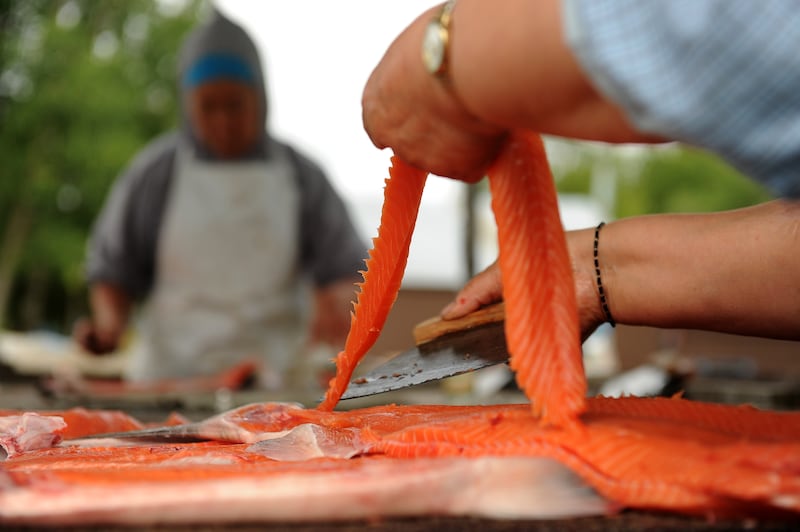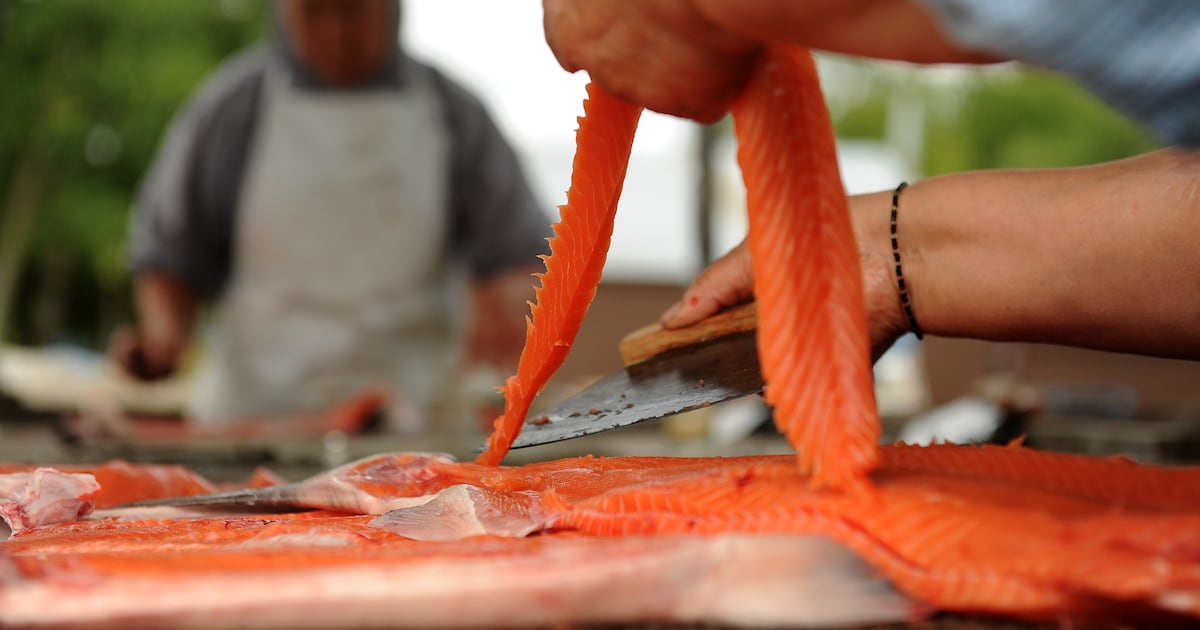 A woman cuts salmon at a fish camp along Kuskokuak Slough on the Kuskokwim River near Bethel on June 28, 2014. (Bob Hallinen / ADN)
A woman cuts salmon at a fish camp along Kuskokuak Slough on the Kuskokwim River near Bethel on June 28, 2014. (Bob Hallinen / ADN)
A federal appeals court has ruled against Gov. Mike Dunleavy’s administration in its battle with the federal government over management authority of subsistence fishing on a Southwest Alaska river.
A three-judge panel for the 9th Circuit Court of Appeals on Wednesday ruled that U.S. District Court Judge Sharon Gleason last year correctly ordered the state to stop interfering in the federal government’s management of the rural subsistence priority on the Kuskokwim River, according to the 40-page decision.
Alaska Attorney General Treg Taylor on Thursday issued a statement indicating that the state would appeal the case to the U.S. Supreme Court.
The Alaska Federation of Natives, which had joined the case alongside the federal government and other Native groups and leaders, said the decision was a victory for rural subsistence rights.
A shortage of salmon on the river led to the dispute between the state and federal government over management of subsistence fishing as the river passes through the Yukon Delta National Wildlife Refuge, a 180-mile lower stretch of the waterway, past Bethel to the village of Aniak.
The federal government brought the case in 2022, seeking to stop Alaska from interfering in its efforts to manage fishing in that area. Federal managers had issued emergency orders limiting gillnet fishing to only rural subsistence users for two years, but the state issued conflicting orders to allow fishing for all subsistence users, not just rural ones, the decision says.
The dispute was the latest flare-up between Alaska and the federal government over the rural subsistence priority. The two sides operate their own management regimes, sometimes for the same fish and wildlife populations as they migrate over state and federal lands, leading to what’s called dual management.
The opinion was written by Judge Consuelo M. Callahan, an appointee of President George W. Bush, who was joined by Roopali H. Desai and Ana de Alba, appointees for former President Joe Biden.
[Aleut regional corporation rejoins Alaska Federation of Natives after receiving apology]
The decision seeks to strike a balance between major court rulings that raise questions over the reach of state and federal management on Alaska rivers.
The state argues in the case that the river is not “public land” and cannot be federally managed under the 1980 Alaska National Interest Lands Conservation Act.
The state contends that the courts should not follow the precedent established in the so-called Katie John cases that ended in 2014 and upheld the federal subsistence priority on waters associated with federal lands.
Instead, the state argues that the 2019 U.S. Supreme Court decision in the Sturgeon II case should apply, when the top court found that Alaska’s Nation River is not “public land” under the Alaska land conservation act.
The state’s position in the case alarmed Alaska Native leaders who argued that it was an assault on a vital protection in rural Alaska, where many residents, usually Alaska Natives, must hunt and fish to fill their pantries.
The 9th Circuit panel acknowledges that “tension” exists between the Katie John and Sturgeon decisions, Callahan wrote.
But the decisions can be “reasonably harmonized,” Callahan wrote.
Callahan said the Supreme Court had said in 2019 that the Katie John decisions were “not at issue” in the Sturgeon case, which left the rural subsistence fishing priority intact on navigable waters in federal areas.
The state of Alaska at the time had argued that the Katie John precedents should not be disturbed, leading to the Supreme Court’s statement, Callahan wrote.
But the state “now claims that the Katie John Trilogy was wrongly decided and has been overruled by Sturgeon II,” he wrote.
“Alaska’s primary argument is that the Katie John Trilogy is clearly irreconcilable with Sturgeon II,” he wrote.
But the panel “rejected” the state’s arguments and said the cases are not “clearly irreconcilable,” Callahan wrote.
The term “public lands” can have two different meanings within different titles in the 1980s Alaska land conservation act, the decision said. Title VIII, creating the subsistence priority in rural Alaska, applies a broad interpretation of the term, Callahan wrote.
Title VIII calls for an understanding of “public lands” that includes navigable waters where subsistence fishing has traditionally taken place.
Congress created a rural subsistence priority for fish on “navigable waters” on federal lands under the Alaska land conservation act, and the Katie John decision upheld the priority, Callahan wrote. Congress also signaled its approval for that interpretation in appropriations acts, Callahan wrote.
Alaska Attorney General Taylor said in a statement that the appeals court recognized “that prior case law is inconsistent with the recent Supreme Court case.”
But the appeals court “was unwilling to do the hard work of actually overturning its own case law and properly reconciling the meaning of ‘public lands’ in ANILCA,” Taylor said.
“This continues the unworkable dual management approach to our fisheries to the detriment of sustainable management of our fisheries for all rural subsistence users,” Taylor wrote.
“The fish don’t adhere to borders, and our fisheries management shouldn’t either,” Taylor wrote. “I am disappointed but not surprised. We always knew this case would need to be decided at the highest level.”
The Alaska Federation of Natives said in a statement that the decision confirms that Congress created a rural subsistence priority to apply to fish, including salmon, in the navigable waters on federal lands.
The opinion reinforced the importance of salmon to subsistence lifestyles and confirms that the law supports access to traditional fishing grounds, the group said.
“This victory preserving the rural subsistence priority is a testament to our collective resilience and determination to protect our rights and culture for future generations,” said Ana Hoffman, co-chair of the Alaska Federation of Natives.
Joe Nelson, also co-chair of the group, said the decision is a victory and a step in the right direction.
“This ‘win’ is one of many more to come as we continue the endless work of protecting our way of life,” he said in the statement. “The dual management compromise will continue testing us — until we fix it.”
[As climate change upends subsistence, Alaska tribes and villages turn to gardens]

